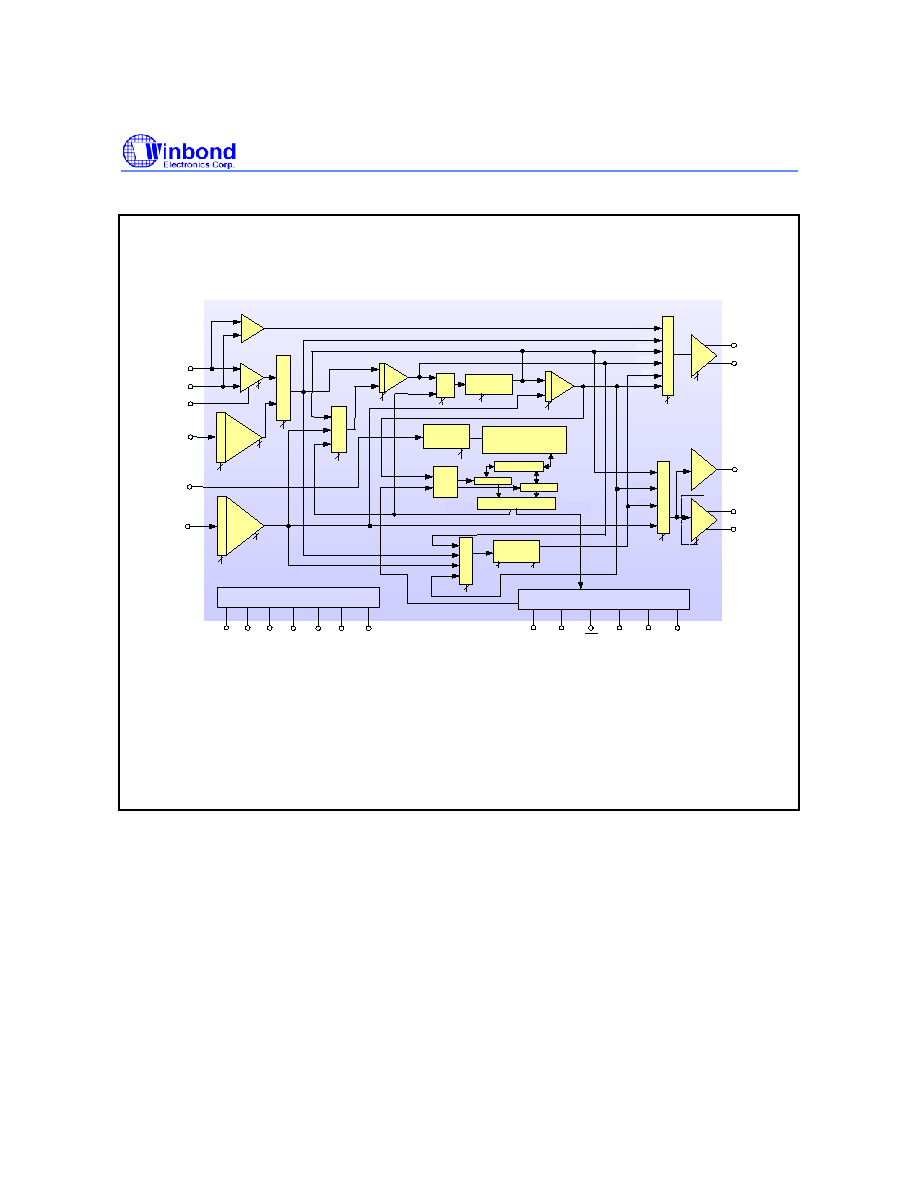 | –≠–ª–µ–∫—Ç—Ä–æ–Ω–Ω—ã–π –∫–æ–º–ø–æ–Ω–µ–Ω—Ç: 15102EI | –°–∫–∞—á–∞—Ç—å:  PDF PDF  ZIP ZIP |

PRELIMINARY
Publication Release Date: October, 2003
- 1 -
Revision 0.2
ISD5100 SERIES
SINGLE-CHIP
1 TO 16 MINUTES DURATION
VOICE RECORD/PLAYBACK DEVICES
WITH DIGITAL STORAGE CAPABILITY

ISD5100 ≠ SERIES
- 2 -
1. GENERAL DESCRIPTION
The ISD5100 ChipCorder
Series provide high quality, fully integrated, single-chip Record/Playback
solutions for 1- to 16-minute messaging applications that are ideal for use in cellular phones,
automotive communications, GPS/navigation systems and other portable products. The ISD5100
Series products are an enhancement of the ISD5000 architecture, providing: 1) the I
2
C serial port -
address, control and duration selection are accomplished through an I
2
C interface to minimize pin
count (ONLY two control lines required); 2) the capability of storing digital data, in addition to analog
data. This feature allows customers to store phone numbers, system configuration parameters and
message address locations for message management capability; 3) Various internal circuit blocks can
be individually powered-up or -down for power saving.
The ISD5100 Series include:
∑ ISD5116 from 8 to 16 minutes
∑ ISD5108 from 4 to 8 minutes
∑ ISD5104 from 2 to 4 minutes
∑ ISD5102 from 1 to 2 minutes
Analog functions and audio gating have also been integrated into the ISD5100 Series products to
allow easy interface with integrated digital cellular chip sets on the market. Audio paths have been
designed to enable full duplex conversation record, voice memo, answering machine (including
outgoing message playback) and call screening features. This product enables playback of messages
while the phone is in standby, AND both simplex and duplex playback of messages while on a phone
call.
Additional voice storage features for digital cellular phones include: 1) a personalized outgoing
message can be sent to the person by getting caller-ID information from the host chipset, 2) a private
call announce while on call can be heard from the host by giving caller-ID on call waiting information
from the host chipset.
Logic Interface Options of 2.0V and 3.0V are supported by the ISD5100 Series to accommodate
portable communication products (2.0- and 3.0-volt required).
Like other ChipCorder
Æ
products, the ISD5100 Series integrate the sampling clock, anti-aliasing and
smoothing filters, and the multi-level storage array on a single-chip. For enhanced voice features, the
ISD5100 Series eliminate external circuitry by integrating automatic gain control (AGC), a power
amplifier/speaker driver, volume control, summing amplifiers, analog switches, and a car kit interface.
Input level adjustable amplifiers are also included, providing a flexible interface for multiple
applications.
Recordings are stored into on-chip nonvolatile memory cells, providing zero-power message storage.
This unique, single-chip solution is made possible through Winbond's patented multilevel storage
technology. Voice and audio signals are stored directly into solid-state memory in their natural,
uncompressed form, providing superior quality on voice and music reproduction.

ISD5100 ≠ SERIES
Publication Release Date: October, 2003
- 3 -
Revision 0.2
2. FEATURES
Fully-Integrated Solution
∑
Single-chip voice record/playback solution
∑
Dual storage of digital and analog data
∑
Durations
8 to 16-minute (ISD5116)
4 to
8-minute (ISD5108)
2 to
4-minute (ISD5104)
1 to
2-minute (ISD5102)
Low Power Consumption
∑
+2.7 to +3.3V (V
CC
) Supply Voltage
∑
Supports 2.0V and 3.0V interface logic
∑
Operating Current:
I
CC Play
= 15 mA (typical)
I
CC Rec
= 30 mA (typical)
I
CC Feedthrough
= 12 mA (typical)
∑
Standby Current:
I
SB
= 1
µA (typical)
∑
Most stages can be individually powered down to minimize power consumption
Enhanced Voice Features
∑
One or two-way conversation record
∑
One or two-way message playback
∑
Voice memo record and playback
∑
Private call screening
∑
In-terminal answering machine
∑
Personalized outgoing message
∑
Private call announce while on call
Digital Memory Features
∑
Up to 4 Mb available (ISD5116)
∑
Up to 2 Mb available (ISD5108)
∑
Up to 1 Mb available (ISD5104)
∑
Up to 512Kb available (ISD5102)
∑
Storage of phone numbers, system configuration parameters and message address table in cellular
application
Easy-to-use and Control
∑
No compression algorithm development required
∑
User-controllable sampling rates
∑
Programmable analog interface
∑
Standard & Fast mode I
2
C serial interface (100kHz ≠ 400 kHz)
∑
Fully addressable for multiple messages
High Quality Solution
∑
High quality voice and music reproduction
∑
Winbond's standard 100-year message retention (typical)
∑
100K record cycles (typical) for analog data
∑
10K record cycles (typical) for digital data
Options
∑
Available in die form, TSOP and SOIC and PDIP (ISD5116 Only)
∑
Temperature: Commercial ≠ Packaged (0 to +70∞C) & die (0 to +50∞C); Industrial (-40 to +85∞C)

ISD5100 ≠ SERIES
- 4 -
3. BLOCK DIAGRAM
ISD5100-Series Block Diagram
AUX IN
AMP
1.
0 /
1.
4 /
2.
0 /
2.
8
AGC
SU
M1
MU
X
Vo
l
MU
X
Filt
e
r
MU
X
Low Pass
Filter
SUM1
FTHRU
INP
ANA O
U
T
M
U
X
VOL
SUM2
ANA IN
VOL
SP+
SP-
SPEAKER
AUX OUT
ANA OUT-
ANA OUT+
MIC+
MIC -
AGCCAP
MICROPHONE
AUX IN
XCLK
ANA IN
V
SSA
V
CCA
V
SSA
V
SSD
V
SSD
V
CCD
V
CCD
64-bit/samp.
ARRAY OUTPUT MUX
ARRAY
IN
P
U
T
MU
X
Input
S
our
c
e
M
U
X
Array I/O Mux
FILTO
SUM1
INP
ANA IN
SUM2
FILTO
SUM2
SUM1
Summing
AMP
ANA IN
AMP
0.
625/
0.
883/
1.
25/
1.
76
6dB
SUM2
Summing
AMP
Out
put
M
U
X
Volume
Control
MIC IN
AUX IN
FILTO
ANA IN
SUM1
ANA IN
FILTO
SUM2
(ANALOG)
ARRAY
INP
SUM1 MUX
CTRL
(DIGITAL)
64-bit/samp.
ARRAY OUT
(ANALOG)
ARRAY OUT
(DIGITAL)
ARRAY
Spkr
.
AMP
AUX
OUT
AMP
Power Conditioning
RAC
INT
SDA
SCL
A1
A0
Device Control
Internal
Clock
Multilevel/Digital
Storage Array
ANA
OUT
AMP
2
( )
VLS0
VLS1
2
( )
AIG0
AIG1
2
( )
AXG0
AXG1
2
( )
S1S0
S1S1
2
( )
S1M0
S1M1
2
( )
S2M0
S2M1
( )
OPA0
OPA1
2
( )
OPS0
OPS1
2
( )
FLD0
FLD1
2
(INS0)
1
1
(AXPD)
1
(AGPD)
1
(FLPD)
1
(FLS0)
1
(AIPD)
1
(AOPD)
( )
3
AOS0
AOS1
AOS2
3
( )
VOL0
VOL1
VOL2
1
(V
LPD
)

ISD5100 ≠ SERIES
Publication Release Date: October, 2003
- 5 -
Revision 0.2
4. TABLE OF CONTENTS
1. GENERAL DESCRIPTION...................................................................................................................2
2. FEATURES ..........................................................................................................................................3
3. BLOCK DIAGRAM................................................................................................................................4
4. TABLE OF CONTENTS .......................................................................................................................5
5. PIN CONFIGURATION ........................................................................................................................7
6. PIN DESCRIPTION ..............................................................................................................................8
7. FUNCTIONAL DESCRIPTION.............................................................................................................9
7.1. Overview ........................................................................................................................................9
7.1.1 Speech/Voice Quality...............................................................................................................9
7.1.2. Duration...................................................................................................................................9
7.1.3. Flash Technology....................................................................................................................9
7.1.4. Microcontroller Interface..........................................................................................................9
7.1.5. Programming.........................................................................................................................10
7.2. Functional Details ........................................................................................................................10
7.2.1. Internal Registers ..................................................................................................................11
7.2.2. Memory Architecture .............................................................................................................11
7.3. Operational Modes Description ...................................................................................................12
7.3.1. I
2
C Interface ..........................................................................................................................12
7.3.2. I
2
C Control Registers ............................................................................................................16
7.3.3. Opcode Summary .................................................................................................................17
7.3.4. Data Bytes.............................................................................................................................19
7.3.5. Configuration Resiter Bytes ..................................................................................................20
7.3.6. Power-up Sequence..............................................................................................................21
7.3.7. Feed Through Mode..............................................................................................................22
7.3.8. Call Record............................................................................................................................24
7.3.9. Memo Record........................................................................................................................25
7.3.10. Memo and Call Playback ....................................................................................................26
7.3.11. Message Cueing .................................................................................................................27
7.4. Analog Mode................................................................................................................................28
7.4.1. Aux In and Ana In Description...............................................................................................28
7.4.2. ISD5100 Series Analog Structure (left half) Description.......................................................29
7.4.3. ISD5100 Series Aanalog Structure (right half) Description ..................................................30
7.4.4. Volume Control Description ..................................................................................................31
7.4.5. Speaker and Aux Out Description.........................................................................................32




